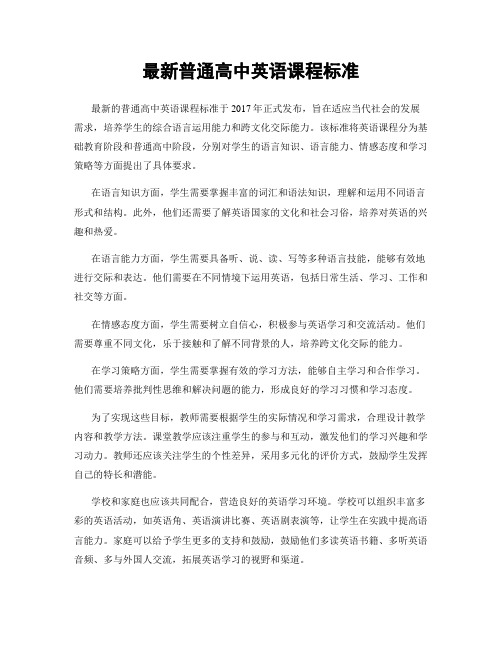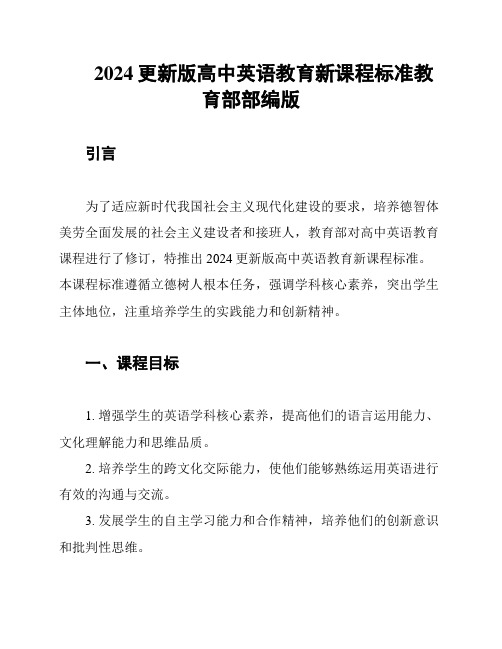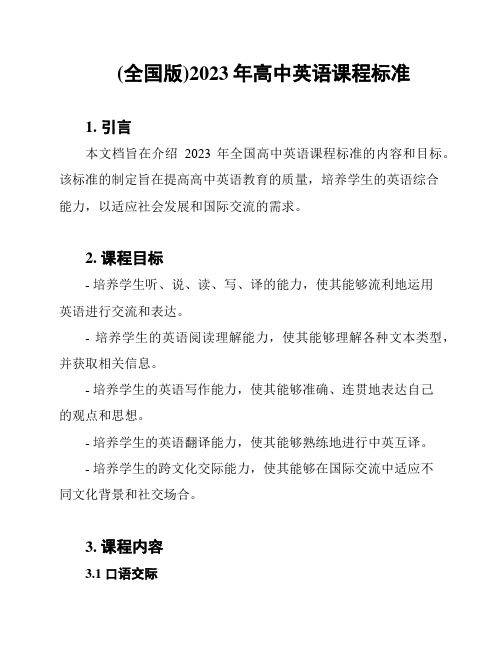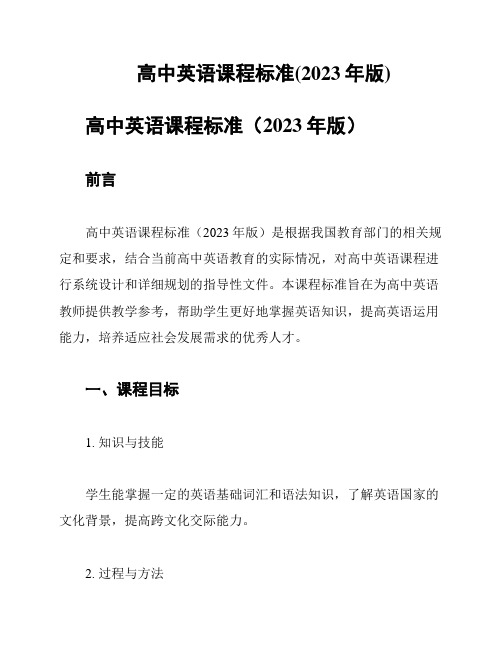最新普通高中英语课程标准(附
最新普通高中英语课程标准

最新普通高中英语课程标准最新的普通高中英语课程标准于2017年正式发布,旨在适应当代社会的发展需求,培养学生的综合语言运用能力和跨文化交际能力。
该标准将英语课程分为基础教育阶段和普通高中阶段,分别对学生的语言知识、语言能力、情感态度和学习策略等方面提出了具体要求。
在语言知识方面,学生需要掌握丰富的词汇和语法知识,理解和运用不同语言形式和结构。
此外,他们还需要了解英语国家的文化和社会习俗,培养对英语的兴趣和热爱。
在语言能力方面,学生需要具备听、说、读、写等多种语言技能,能够有效地进行交际和表达。
他们需要在不同情境下运用英语,包括日常生活、学习、工作和社交等方面。
在情感态度方面,学生需要树立自信心,积极参与英语学习和交流活动。
他们需要尊重不同文化,乐于接触和了解不同背景的人,培养跨文化交际的能力。
在学习策略方面,学生需要掌握有效的学习方法,能够自主学习和合作学习。
他们需要培养批判性思维和解决问题的能力,形成良好的学习习惯和学习态度。
为了实现这些目标,教师需要根据学生的实际情况和学习需求,合理设计教学内容和教学方法。
课堂教学应该注重学生的参与和互动,激发他们的学习兴趣和学习动力。
教师还应该关注学生的个性差异,采用多元化的评价方式,鼓励学生发挥自己的特长和潜能。
学校和家庭也应该共同配合,营造良好的英语学习环境。
学校可以组织丰富多彩的英语活动,如英语角、英语演讲比赛、英语剧表演等,让学生在实践中提高语言能力。
家庭可以给予学生更多的支持和鼓励,鼓励他们多读英语书籍、多听英语音频、多与外国人交流,拓展英语学习的视野和渠道。
总的来说,最新的普通高中英语课程标准旨在培养学生的综合语言运用能力和跨文化交际能力,要求学生掌握丰富的语言知识,具备多种语言能力,树立积极的情感态度,掌握有效的学习策略。
教师、学校和家庭应该共同努力,为学生的英语学习提供更好的支持和帮助。
只有这样,学生才能真正受益于英语学习,为未来的发展打下坚实的语言基础。
(2023年全国版)高中英语课程标准

(2023年全国版)高中英语课程标准一、前言1.1 课程标准的重要性高中英语课程标准是高中英语教学的指导性文件,对全国高中英语教学具有重要的指导作用。
本课程标准旨在指导高中英语教学,提高学生的英语素养,培养学生的英语应用能力,为学生的终身发展奠定基础。
1.2 课程标准的适用范围本课程标准适用于全国范围内的高中英语教学。
二、课程目标2.1 总体目标培养学生具有较强的英语听、说、读、写能力,能够运用英语进行有效的沟通与交流,提高学生的英语学科核心素养。
2.2 分级目标高中英语课程分为三个级别,分别为一级、二级和三级。
各级别的具体目标如下:- 一级目标:培养学生基本的英语听、说、读、写能力,使学生能够顺利进行简单的英语交流。
- 二级目标:在一级目标的基础上,提高学生的英语听、说、读、写能力,使学生能够熟练地运用英语进行交流。
- 三级目标:在一级和二级目标的基础上,进一步提高学生的英语听、说、读、写能力,使学生能够运用英语进行复杂的交流和表达。
三、课程内容高中英语课程内容包括语言知识、语言技能、学习策略和文化意识四个方面。
3.1 语言知识包括语音、词汇、语法、功能项目和话题等五个方面。
3.2 语言技能包括听、说、读、写四个方面。
3.3 学习策略包括认知策略、调控策略、交际策略和资源策略等四个方面。
3.4 文化意识培养学生对英语国家文化及中华文化的了解和认识,提高学生的跨文化交际能力。
四、课程实施与评价4.1 教学建议教师应根据课程标准进行教学设计,注重培养学生的英语实践能力,创设真实的语言学习环境,激发学生的学习兴趣。
4.2 评价建议对学生的英语学习进行多元化评价,包括过程性评价和终结性评价。
评价应注重学生的全面发展,不仅关注学生的语言知识与技能,还要关注学生的学习策略、情感态度和文化意识等方面。
五、附录5.1 课程标准词汇表包含各级别的词汇及其用法。
5.2 课程标准语法项目表包含各级别的语法项目及其用法。
2024更新版高中英语教育新课程标准教育部部编版

2024更新版高中英语教育新课程标准教育部部编版引言为了适应新时代我国社会主义现代化建设的要求,培养德智体美劳全面发展的社会主义建设者和接班人,教育部对高中英语教育课程进行了修订,特推出2024更新版高中英语教育新课程标准。
本课程标准遵循立德树人根本任务,强调学科核心素养,突出学生主体地位,注重培养学生的实践能力和创新精神。
一、课程目标1. 增强学生的英语学科核心素养,提高他们的语言运用能力、文化理解能力和思维品质。
2. 培养学生的跨文化交际能力,使他们能够熟练运用英语进行有效的沟通与交流。
3. 发展学生的自主学习能力和合作精神,培养他们的创新意识和批判性思维。
4. 帮助学生了解世界多元文化,拓宽国际视野,增强民族自豪感和文化自信心。
二、课程内容1. 语言知识:包括语音、词汇、语法、功能项目和话题等,注重培养学生的语言运用能力。
2. 文化背景:涵盖英语国家的文化、历史、社会等方面的知识,帮助学生理解西方文化,提高跨文化交际能力。
3. 技能训练:听说读写四大技能的综合训练,以及相应的策略运用,提高学生的语言实际运用能力。
4. 任务型教学:通过完成各种真实的任务,培养学生的实践能力和创新精神,使他们在实践中学会学习、学会合作、学会生存。
三、课程实施1. 教学方法:采用任务型教学、合作学习和探究学习等方法,充分发挥学生的主体作用。
2. 教学手段:充分利用多媒体、网络等现代教育技术手段,提高教学效果和学生的学习兴趣。
3. 评价方式:注重形成性评价和终结性评价相结合,全面、多元地评价学生的学科核心素养。
4. 课程资源:开发和利用各种课程资源,丰富教学内容,提高学生的学习体验。
四、课程安排1. 课时安排:高中英语课程每周安排3-4课时,共计240课时。
2. 课程结构:分为必修课程、选择性必修课程和选修课程,满足不同学生的学习需求。
3. 学段安排:分为三个学段,每个学段40课时,每个学段结束后进行阶段性评价。
(全国版)2023年高中英语课程标准

(全国版)2023年高中英语课程标准1. 引言本文档旨在介绍2023年全国高中英语课程标准的内容和目标。
该标准的制定旨在提高高中英语教育的质量,培养学生的英语综合能力,以适应社会发展和国际交流的需求。
2. 课程目标- 培养学生听、说、读、写、译的能力,使其能够流利地运用英语进行交流和表达。
- 培养学生的英语阅读理解能力,使其能够理解各种文本类型,并获取相关信息。
- 培养学生的英语写作能力,使其能够准确、连贯地表达自己的观点和思想。
- 培养学生的英语翻译能力,使其能够熟练地进行中英互译。
- 培养学生的跨文化交际能力,使其能够在国际交流中适应不同文化背景和社交场合。
3. 课程内容3.1 口语交际- 学习基本的日常用语和问答句型,能够进行简单的日常口语交流。
- 学习表达自己的观点、意见和感受,能够参与小组讨论和演讲。
- 学习听力技巧和口语表达技巧,提高听说能力。
3.2 阅读理解- 学习不同文本类型的阅读技巧,如新闻报道、广告、小说、科普文章等。
- 学习提取关键信息、推理判断和理解作者意图的能力。
- 学习扩展词汇量和掌握常见语法结构,以提高阅读理解能力。
3.3 写作表达- 学习不同类型的写作形式,如记叙文、说明文、议论文等。
- 学习组织思路、构建段落和使用合适的过渡词语,以提高写作连贯性。
- 学习修辞手法和丰富词汇,使写作更具表现力和准确性。
3.4 翻译技能- 学习中英互译的基本技巧和常用翻译策略。
- 学习词义辨析、语法转换和语境适应的能力,以提高翻译准确性和流畅性。
- 学习运用翻译工具和资源,如词典、翻译软件等。
3.5 跨文化交际- 学习不同文化背景下的礼仪和习俗,提高跨文化交际的能力。
- 学习文化差异的理解和尊重,培养国际视野和包容心态。
- 学习通过语言和行为适应不同社交场合和交际需求。
4. 教学方法- 采用任务型教学法,注重学生的实际语言运用能力。
- 注重听说读写的综合训练,提高学生的语言表达能力。
普通高中《英语课程标准》

普通高中《英语课程标准》摘要:一、课程性质与基本理念1.普通高中英语课程的重要性2.课程的基本理念二、课程目标1.培养学生的英语学科核心素养2.发展学生的语言能力3.提高学生的思维品质4.提升学生的文化意识三、课程内容1.语言知识与技能2.文化知识3.语言技能4.学习策略四、课程实施与评价1.教学建议2.评价建议3.教材编写建议正文:《普通高中英语课程标准》是为了全面贯彻党的教育方针,落实立德树人根本任务,发展英语学科核心素养,培养社会主义建设者和接班人而制定的。
本文将对课程标准的主要内容进行解读。
一、课程性质与基本理念普通高中英语课程是高中阶段全面贯彻党的教育方针、落实立德树人根本任务、发展英语学科核心素养、培养社会主义建设者和接班人的重要课程。
课程旨在培养学生的英语学科核心素养,包括语言能力、思维品质和文化意识,为学生终身学习和发展奠定基础。
二、课程目标课程目标是培养学生的英语学科核心素养,包括:1.培养学生的语言能力。
通过学习和实践,使学生具备良好的语言表达能力、理解能力、听力和口语能力,能够运用英语进行有效的沟通和交流。
2.发展学生的思维品质。
培养学生具备逻辑思维、批判性思维和创新思维的能力,使学生能够从不同的角度看待问题,运用英语进行思考和分析。
3.提升学生的文化意识。
使学生了解和理解不同文化背景下的习俗、价值观和思维方式,提高学生的跨文化交际能力。
4.提高学生的学习能力。
培养学生具备自主学习、合作学习和探究学习的能力,使学生能够适应不同的学习环境,运用英语进行自我提升和发展。
三、课程内容课程内容主要包括语言知识与技能、文化知识、语言技能和学习策略。
1.语言知识与技能。
包括语音、词汇、语法、语用等方面的知识,以及听、说、读、写等方面的技能。
2.文化知识。
包括英语国家的文化背景、文化习俗、文化价值观等方面的知识。
3.语言技能。
包括听、说、读、写等方面的技能,以及语言沟通、语言表达、语言理解等方面的能力。
(2023年全国版)高中英语课程标准

(2023年全国版)高中英语课程标准简介本文档旨在概述2023年全国版高中英语课程标准的主要内容。
该课程标准是为了提高高中英语教学质量、培养学生的英语能力而制定的。
目标高中英语课程标准的目标是培养学生的英语语言能力和综合运用能力,使学生能够流利、准确地运用英语进行交流和思维,以满足日常生活、学习和工作的需求。
内容高中英语课程标准的内容主要包括以下几个方面:1. 听力:通过多样化的听力材料和任务,培养学生的听力理解能力和听取信息的能力。
2. 口语:通过丰富的口语练习活动,提高学生的口语表达能力和交际能力。
3. 阅读:通过阅读各类英文文本,培养学生的阅读理解能力和提高学生的词汇量。
4. 写作:通过写作任务和练习,培养学生的写作能力和思维逻辑能力。
5. 文化与社会知识:通过学习英语国家的文化和社会知识,增加学生的跨文化交际能力。
6. 语言知识:通过系统学习英语的语音、词汇、语法和语用知识,提高学生的语言运用能力。
教学方法高中英语课程标准鼓励教师采用多种教学方法和策略,包括但不限于:1. 任务型教学:通过设计真实的交际任务,激发学生的学习兴趣和动机。
2. 合作学习:通过小组合作和互助学习,培养学生的合作精神和团队意识。
3. 创新教学:通过引入新颖的教学资源和技术手段,提供多样化的学习体验。
4. 情感教育:通过关注学生情感发展,培养学生的自信心和积极情感。
评价方法高中英语课程标准强调综合评价和多元化评价方法,包括但不限于:1. 综合测试:通过考察听、说、读、写等各方面的能力,全面评价学生的英语水平。
2. 个人作业:通过布置个人作业,评价学生的学习态度和自主学习能力。
3. 小组项目:通过小组合作项目,评价学生的合作能力和创新能力。
4. 口语表现:通过口语交流活动,评价学生的口语表达能力和交际能力。
结论2023年全国版高中英语课程标准旨在提高学生的英语能力和综合素养,通过多样化的教学方法和评价方法,培养学生的语言运用能力和跨文化交际能力。
(2023年全国版)高中英语课程标准

(2023年全国版)高中英语课程标准简介该文档旨在介绍2023年全国版高中英语课程标准的内容和目标。
本文档将提供一个简要的概述,但不会总结具体内容。
课程目标- 培养学生的英语听、说、读、写、译等综合语言运用能力。
- 提高学生的跨文化交际能力,培养他们具备全球视野和国际竞争力。
- 培养学生的英语研究兴趣和自主研究能力,促进他们终身研究的能力发展。
课程内容1. 语言知识与技能- 词汇:扩大词汇量,提高词汇应用能力。
- 语法:掌握基本语法规则,能正确运用于语言表达中。
- 语音:准确发音,提高口语表达能力。
- 阅读:培养阅读理解能力,提高阅读速度和理解深度。
- 写作:培养写作能力,包括书面表达和创意写作。
- 听力:提高听力理解能力,培养听写和听说能力。
2. 跨文化交际- 了解不同文化背景下的价值观、礼仪和社会俗。
- 掌握跨文化交际中的语言表达和行为规范。
- 培养尊重和欣赏不同文化的能力。
3. 研究策略和方法- 培养学生的自主研究能力,引导他们积极探索和运用研究策略。
- 提供有效的研究方法和资源,帮助学生高效研究英语。
评价标准- 语言技能评价:通过考试、测验等方式评估学生的听、说、读、写、译等语言技能。
- 综合能力评价:综合考察学生的语言运用能力和跨文化交际能力。
- 学业水平评价:综合评估学生的研究成绩、研究态度和研究能力。
结语以上是(2023年全国版)高中英语课程标准的简要概述,旨在帮助教师和学生更好地了解课程目标和内容。
详细的课程标准内容请参考相关教材和官方文件。
高中英语课程标准(2023年版)

高中英语课程标准(2023年版)高中英语课程标准(2023年版)前言高中英语课程标准(2023年版)是根据我国教育部门的相关规定和要求,结合当前高中英语教育的实际情况,对高中英语课程进行系统设计和详细规划的指导性文件。
本课程标准旨在为高中英语教师提供教学参考,帮助学生更好地掌握英语知识,提高英语运用能力,培养适应社会发展需求的优秀人才。
一、课程目标1. 知识与技能学生能掌握一定的英语基础词汇和语法知识,了解英语国家的文化背景,提高跨文化交际能力。
2. 过程与方法学生能通过自主学习、合作学习和探究学习等方式,提高英语学习兴趣和积极性,培养良好的学习习惯和策略。
3. 情感态度与价值观学生能树立正确的价值观,增强社会责任感和国际视野,培养合作精神和创新意识。
二、课程内容1. 必修课程必修课程包括听力、口语、阅读、写作和翻译等五个方面,涵盖了英语基础词汇、语法、功能用语和跨文化交际等内容。
2. 选修课程选修课程包括英语视听说、英语阅读与写作、英语戏剧表演、英语学术报告等,旨在提高学生的英语兴趣和特长。
三、课程实施1. 教学建议教师应根据课程标准和学生的实际情况,合理设计教学活动,注重启发式教学,提高学生的参与度和积极性。
2. 评价与反馈教师应定期进行课堂评价和学业评价,关注学生的学习过程和成果,及时给予反馈,帮助学生调整学习策略。
3. 课程资源教师可利用现代教育技术,如多媒体、网络等资源,丰富教学内容,提高教学质量。
四、课程评价课程评价应遵循客观、公正、全面的原则,注重过程评价和终结评价相结合,以促进学生全面发展为目标。
附录附录包括课程标准解读、教学建议案例、评价方法示例等,供教师在实际教学中参考。
---以上为高中英语课程标准(2023年版)的主要内容,供各位教师在实际教学中参考。
如有未尽事宜,请结合教育部门的相关规定和实际情况予以调整。
- 1、下载文档前请自行甄别文档内容的完整性,平台不提供额外的编辑、内容补充、找答案等附加服务。
- 2、"仅部分预览"的文档,不可在线预览部分如存在完整性等问题,可反馈申请退款(可完整预览的文档不适用该条件!)。
- 3、如文档侵犯您的权益,请联系客服反馈,我们会尽快为您处理(人工客服工作时间:9:00-18:30)。
普通高中英语课程标准(附录)一、语音项目表说明:1.语音教学是语言教学的重要内容之一。
自然规范的语音、语调将为有效的口语交际打下良好的基础。
语音教学应注重语义与语境、语调与语流相结合,要强调语音、语调在实际口语交流中的运用。
2.英语有不同的口音,如:英国口音、美国口音等。
教学中,应让学生在基本掌握一种口音的基础上,适当接触不同的口音,为他们发展交际能力打下基础。
1.基本读音(1)26个字母读音(2)元音宇母在重读音节中的读音(3)元音字母在轻读音节中的读音(4)元音字母组合在重读音节中的读音(5)常见的元音字母组合在轻读音节中的读音(6)辅音字母组合的读音(7)辅音连缀的读音(8)成节音的读音2.重音(1)单词重音(2)句子重音3.读音的变化(1)连读(2)失去爆破(3)弱读(4)同化4.语谓与节奏(1)意群与停顿(1)语调(2)节奏5.语音、语调、重音、节奏等在口语交流中的运用6.朗诵和演讲中的语音技巧7.主要英语国家的英语语音差异二、语法项目表说明:(1)标*号的项目,七级要求理解,八级要求掌握。
(2)高中阶段的语法教学,应从语言运用的角度出发,把语言的形式、意义和用法有机地结合起来。
要引导学生在语境中了解和掌握语法的表意功能。
1.名词(1)可数名词及其单复数(2)不可数名词(3)专有名词(4)名词所有格2.代词(1)人称代词(2)物主代词(3)反身代词(4)指示代词(5)不定代词(6)疑问代词3.数词(1)基数词(2)序数词4.介词和介词短语5.连词6.形容词(比较级和最高级)7.副词(比较级和最高级)8.冠词9.动词(1)动词的基本形式(2)系动词(3)及物动词和不及物动词(4)助动词(5)情态动词10.时态(1)一般现在时(2)一般过去时(3)一般将来时(4)现在进行时(5)过去进行时(6)过去将来时*(7)将来进行时*(8)现在完成时(9)过去完成时*(8)现在完成进行时* 11.被动语态12.非谓语动词(1)动词不定式(2)动词的-ing形式(3)动词的-ed形式13.构词法(1)合成法(2)派生法(3)转化法(4)缩写和简写14.句子种类(1)陈述句(2)疑问句(3)祈使句(4)感叹句15.句子成分(1)主语(2)谓语(3)表语(4)宾语(5)定语(6)状语(7)补语*16.简单句的基本句型17.主谓一致18.并列复合句19.主从复合句(1)宾语从句(2)状语从句(3)定语从句(4)主语从句*(5)表语从句*20.间接引语*21、省略*22.倒装*23.强调*24.虚拟语气*三、功能意念项目表1. 社会交往(Social Communications)(1)问候(Greetings)A. Hi!Hello!Good morning / afternoon / evening.How are you?How are you doing?Please say hello to your parents.Please give my love / best wishes to Lucy. B. Hi! Hello!Good morning / afternoon / evening.I'm OK.Fine, thanks, and you?Very well, thank you.*Just so so.Sure.All right.(2)介绍(Introduction)A. My name is Jim.I'm a student.I'm from England.This is Mr. / Mrs. / Miss / Ms Brown.I'd like you to meet Bob.* May I introduce Professor Jeff Brown?B. Hello!How do you do?Nice / Glad / Pleased to meet (see)you. (3)告别(Farewells )A. Good-bye / Bye / Bye-bye.Good night.See you later / then / tomorrow / soon.I am sorry I have to go now.* I am afraid I must be leaving now.B. Good-bye / Bye / Bye-bye.See you.Good night.See you later / then / tomorrow / soon. (4)感谢(Thanks )A. Thank you (very much).Thanks a lot.Thank you for your help.It's very kind / nice of you.* I appreciate your help.B. It's a pleasure.* My pleasure.That's OK/ all right.You're welcome.* Don' t mention it.(5)道歉(Apologies)A. Sorry. I'm sorry.Excuse me, please.I beg your pardon.I' m sorry for losing your book.I'm sorry to interrupt you.I'm sorry (that)I'm late.B. That's OK.It's all right.Never mind.It doesn't matter.It's nothing.* Forget it.(6)邀请(Invitation)A. Would you like to go for a walk?You must come to dinner with us.May I invite you to dinner?What / How about having a swim?B. OK.①Thank you.I'd like that, thanks.Yes, I'd love to.That would be very nice.②No, thank you.It's very nice of you, but my mother is ill.I'd love to, but I'm afraid I have no time.I'm sorry I can't. What about another time?(7)请求允许(Asking for permission )A. May I come in?Can / Could I use your telephone?* Is it all right if I sit here?* I wonder if I could smoke here.Would / Do you mind if I open the window?B. ①Yes, please. Sure. Certainly.* Please do. That's all right. Of course, you can.* Go ahead, please.②I'm sorry, it's not allowed.I'm afraid not. You'd better not.* It' s not allowed.* I'm sorry, but you can smoke in the next room.(8)祝贺与祝愿(Expressing wishes and congratulations)A. Have a good day / time!Have a good journey / trip!Good luck!Enjoy yourself!Best wishes to you.Happy New Year!Merry Christmas!Happy birthday!Wish you all the success!Congratulations!Well done!B. Thank you.You, too.The same to you.(9)提供帮助(Offering help)A. Do you want me to clean the room?Can I help you?Would you like me to help you?What can I do for you?Let me take your bags.B. ①Yes, please. Yes, thanks.Thank you.That would be nice / fine.Thank you for your (the)help.②No, thanks / thank you.Thank you all the same.That's very kind of you, but I can manage it myself. (10)接受或拒绝(acceptance and refusal)(11)约会(Making appointments )A. Will you be free tomorrow?Do you have time this afternoon?How about tomorrow morning?When / Where shall we meet?Could we meet at 4:30?Let's make it 4:30.What time is convenient for you?I'd like to make an appointment with Mr. Jones. B. ①Yes, I'll be free then.All right. See you then.②I'm afraid I have no time then.Sorry, I won't be free then. But I'll be free tomorrow. (12)打电话(Making telephone calls )A. Hello! May I speak to Tom?Hello! I'd like to speak to Mr. Green.Is that Liu Ying speaking?Extension six two two six, please.Can I leave a message?I'll call back later / again.I'll ring him / her up again.B. Hello! This is Mary speaking.Hello, who is this?Hold the line, please.Just a moment, please.Hello, who's speaking?Sorry. He / She isn't here right now.Can I take a message?Sorry. I can't hear you.The line is bad / busy.I couldn't get through.Sorry, I'm afraid you have the wrong number.(13)就餐(Having meals)A. Would you like something to eat / drink?What would you like (to have)?Would you like some more fish?Help yourself to some fish.* Which do you prefer, rice or noodles?* What would you like to drink, tea or coffee?B. ①Yes, I'd like a drink.I'd like rice and chicken.Just a little, please.Can I have some more soup?It's so delicious. Thank you.* I prefer noodles to rice. I like green tea.②No, thank you. I've had enough.I'm full, thank you.It's very delicious, but I can't eat any more.(14)就医(Seeing the doctor)A. What's the matter?What seems to be the trouble?Do you have a fever?How long have you felt like this?It's nothing serious.Take this medicine three times a day.You'll be all right / well soon.* Give up smoking and keep on taking more exercises.B. I have a headache / cough / fever.I feel terrible / bad / horrible / awful.I don't feel well.I've got a pain here.It hurts here.*I don't feel like eating.I can't sleep well.(15)购物(Shopping)A. Can / May I help you?What can I do for you?How many / much would you like?What colour / size / kind would you like?What about this one?Here's your change.B. I want /I'd like a pair of shoes.How much is it / are they?May I try it on?It's too big / small.Sorry, it's too expensive.Do you have any other colours / sizes / kinds?Two and a half kilos / pounds, please.That's fine. I'll take it.Just have a look.Well, I'11 think about it.(16)问路(Asking the way)A. Excuse me. Where's the washroom?Can you tell me how to get to the post office?Excuse me. Which bus goes to World Park?Excuse me. Which is the way to the Bank of China?Excuse me. Could you tell me the way t6 the station, please?How can I get to No. 4 Middle School?B. ①It's over there.It's about 400 metres from here.Go down this street until you see the tall red building.Turn right / left at the first / second crossing / comer.You can't miss it.You can take bus No. 103.You'd better take a taxi. ?②Sorry. I don't know. I'm a stranger here.(17)谈论天气(Talking about weather)A. What's the weather like today?How's the weather in Beijing?What a cold / hot day today!It's a nice / fine / beautiful / horrible day today.B. It's sunny / cloudy / windy / rainy / snowy / foggy.It's getting cool / cold / warm / hot.(18)语言交际困难(Language difficulties in communication)Pardon?I beg your pardon? I don't understand. Sorry, I can't follow you.* Could you say that again, please?* Could you repeat that, please? Can you speak more slowly, please? * What do you mean by killing time?How do you say . . . in English?I don't know how to say that in English.I don't know the word in English.How do you spell it, please?I'm sorry I only know a little English.(19)提醒注意(Reminding and warning)Don't forget your raincoat. Remember to lock the door.* Make sure that all the windows are closed.Mind your head/step!No smoking!No spitting!Wet floor!Look out!Be careful!Don't touch!It's dangerous!(20)警告和禁止(Warning and prohibition)(21)劝告(Advice)You'd better go to see the doctor.You should listen to and read English everyday.You need to buy a Chinese-English dictionary.* If I were you, I'd phone him now.Don't rush / hurry/ push. Please stand in line.(22)建议(Suggestions)Let's go and have a look.* Should we go now?What / How about a picnic this Sunday?Why don't you buy a computer?Why not go to a movie?2. 态度(Attitudes)(23)同意和不同意(Agreement and disagreement)Sure. Certainly.* Exactly.* That's correct.Of course. All right.I agree.No problem.That's a good idea.Yes, I think so.No way.Of course not.I don't agree.I don't think so.I'm afraid not.(24)喜欢和不喜欢(Likes and dislikes)This book is very interesting.I like / love the movie (very much).I like / love to play computer games.I like taking photos.I enjoy listening to music.I'm interested in science.He is fond of music.This song is bad / awful.I don't like the movie very much / at all.I don't enjoy collecting stamps.I hate to do homework.(25)肯定和不肯定(Certainty and uncertainty)I'm sure.I'm sure of that.I'm (quite)sure (that)she'll join us.There is no doubt that it's made of silk.It's clear that it will rain soon.I'm not so sure.I'm not sure of that.I'm not sure whether / if she can come.Maybe you're right.Perhaps she is at home now.It's hard to say.(26)可能和不可能(Possibility and impossibility)A. He can / may come today.It may snow tonight. It's possible to finish the homework before 6 o'clock. * It's likely to rain this afternoon.* It's likely that you will lose this game.B. He may not come so early.He can't be in the office now.It's not likely to snow soon.It's impossible to finish my homework within one hour.(27)能够和不能够(Ability and inability)He can ride a bike. He's able to pass the math exam.He is good at football.He can't swim.* He's unable to walk any more.She's not good at swimming.(28)偏爱和优先选择(Preference)I prefer tea. Which do you prefer, tea or coffee?* I prefer tea to coffee.* I'd prefer to go by train.I like English better / the best.My favourite subject is physics.* I'd rather drink coffee than tea,* Where would you rather go, London or Tokyo?(29)意愿和打算(Intentions and plans)I'll go with you.I'm going to see my head teacher this afternoon.I'd like to make a phone call to her after class.I want / hope to find an English pen-friend.I plan to go to Hangzhou this summer.* We are ready to move to a new house.*Bill intends to spend his vocation in California.* I am thinking of driving to Beijing.I won't see the movie again.I'm not going to buy the book.I don't want to live in the big city.(30)希望和愿望(Hope and wish)I wish to see you again.I hope to become a doctor.I hope it stays fine.I wish I were younger.I hope so.I hope not.(31)表扬和鼓励(Praise and encouragement)A. Very good!Well done!Wonderful!Excellent!You speak English very well.Your dress is beautiful!Come on! Keep trying!You can do it!B. Thank you.OK. I'll try it again.(32)责备和抱怨(Blame and complaint)* He's to blame.*She blamed him for coming home late.What do you mean by doing so?How could you cheat your teacher?* He shouldn't have done it.Why didn't you tell me the truth?I'm sorry to have said that, but this room is too dirty, * I hate to have to say this, but it's too noisy here. Why don't you do something about it?(33)冷淡(Indifference)I don't care,* I don't care what you do.It doesn't matter to me.* I don't mind if you smoke.* It's none of my business.(34)判断与评价(judgement and evaluation)3. 情感(Emotions)(35)高兴(Happiness)How wonderful / nice!That's lovely / great / wonderful!I'm so happy.It's well done.I'm pleased to know that.(36)惊奇(Surprise)Really?Oh dear!Is that so?What a surprise!How nice to see you!How surprising!I'm surprised.* It surprises me that your English is so beautiful.Does that surprise you?* Is this what you expected?(37)忧虑(Worries)What's wrong?What's the matter?Anything wrong?What should we do?* Is something worrying you?Are you worried about your health?(38)安慰(Reassurance)There, there. Don't be afraid.Don't worry.It's (quite)all right.It'll be OK / all right.(39)满意(Satisfaction)Good!Well done!Perfect!That's fine.That's better.That's good enough.I'm pleased with your spoken English.(40)遗憾(Regret)I'm so sorry!It's a great pity!What a shame!That's too bad!* I wish I had never given it up.* If I had been there, he would not have made such a serious mistake. (41)同情(Sympathy)I'm so sorry!I'm so sorry about your illness.I'm sorry to hear you are going away.Please accept my deep sympathy.(42)恐惧(Fear)Help!How terrible!I'm afraid of that dog.I'm frightened.* You scared me!* I dare not go out at night.(43)愤怒(Anger)* Damn!* Isn't it annoying!* What a stupid idiot!4. 时间(Time)(44)时刻(Point of time)A. Excuse me. What's the time, please?Excuse me. What time is it?* Have you got the time?When did you come to China?What time do you get up every day?B. It's half past five / twenty to nine.I came to China in 1998.I get up at 6 o'clock.(45)时段(Duration)A. How long have you been in this school?How long does it take you to get to school?When did you live in Beijing?How long have you been ill?B. I have been in this school for three years.It takes me twenty minutes by bike.I lived in Beijing from 1996 to 1999.I have been ill since last Monday night.(46)频度(Frequency)A. How often do you go to movies?B. I go to the movie once a week.I often go to movies.(47)时序(Sequence)* The cat ran here and there, first on this side, then on that side. What did you do next?Finally we found our way out.It rained even harder later on.5. 空间(Space)(48)位置(Position)B. B. It's on / at / above / in / under / beside / near / behind the table. He sits at the back of the room.The lab is in the centre of the school.(49)方向(Direction)A. Which is the way to the station?Where is the train / bus going?Where are you going?* Are you going up / down?B. Go down this street, and turn left / right at the first crossing. The train is going to Xi'an.The train is going to the east / west / south / north.I'm going to the railway station. I'm leaving for Shanghai.(50)距离(Distance)A. How far is your school from here?B. It's about 40 minutes by bike.It's about 6 kilometres / miles away.6. 存在(Existence)(51)存在(Existence and Non-existence)A. Is there a bird in the tree?Are there any apples in the tree?What's in the tree?B. Yes, there is / are.There's a bird in the tree.There are many / a lot of birds in the tree.A. Is there an English book in the schoolbag?Are there any English books in the schoolbag?Isn't there any water in the bottle?" Does water exist on the moon?B. No, there isn't / aren't (any).There isn't an English book in the schoolbag.There aren't any English books in the schoolbag.No, there's no water in the bottle.There's no more paper in the printer.* No water exists on the moon.7. 特征(Features)(52)形状(Shape)A. What does it look like?What's the shape of the clouds?B. It looks like a camel.It's round / long / tall / short.It's a circle / square.It's a U-shaped road.(53)颜色(Colour)B. It's green / red / blue / yellow / black / white / orange / purple / light brown / dark blue. * I like the photo in black and white.(54)材料(Material)A. What's the table made of?What's the red wine made from? B. It's made of wood.It's made from grapes.I bought a woollen sweater yesterday.(55)价格(Price)A. How much is the dictionary?How much is it?How much are they?Is it cheap / expensive? B. The dictionary costs me 100 yuan.The dictionary is expensive / cheap.(56)规格(Size)A. What size is your sweater?What size shoes do you wear? B. The size of my sweater is XXL.It's too big / small / long / short for me.(57)年龄(Age)A. How old are you?How old is he / she? B. I'm eighteen.He / She is six years old. Uncle Wang is an old man.8. 计量(Measurement)(58)长度(Length)A. How long is the bridge?B. It's 430 metres / feet long.(59)宽度(Width)A. How wide is the river?B. It's about 200 metres wide.(60)高度(Height)A. How tall / high is the building?B. It's 130 metres tall / high.The building has 85 floors / stories.(61)数量(Number)A. How many students are there in your class?How much water do you drink every day?B. There are forty students in our class.I drink five glasses of water every day.9. 比较(Comparison)(62)同级比较(Equal comparison)My ruler is as long as yours.I can run as fast as you can.This book is not as interesting as that one.I can't run so fast as you can.(63)差别比较(Comparative and superlative)Lily is younger than Kate.The red skirt is more expensive than the yellow one.I run faster than Jim.Mrs. Baker walks more slowly than Mr. Baker.Jim is the tallest in his class.Tom is the best of all.(64)相似和差别(Similarity and difference)This picture is the same as that one on the wall.Lucy is like her mother.Tom looks like his father.My picture is different from yours.There are five differences between the two pictures.10. 逻辑关系(Logical relations)(65)原因和结果(Cause and effect )A. Why are you late for school?How could you miss the train / plane?B. Because I got up late this morning.*As he was ill, he couldn't come to school.Since she did not feel well, she stayed at home.Because of the bad traffic, we missed the train.* Due to the heavy fog, the planes were delayed.* The reason is that he is not careful enough in his work.He ate too much, so he did not feel well.* It is so dark that I can not see anything in the room.(66)目的(Purpose)A. Why are you here today?Why did you do that? B. I came here to see you off.* I did that in order to protect the trees.11. 职业(Occupation)(67)工作(Job)A. What do you do? What's your job?What are you going to be?B. I'm a teacher / doctor / worker / farmer / businessman / manager. I'm going to be a scientist / computer engineer.(68)单位(Employer)A. Where do you work?* What company are you working for?B. I'm teaching English In a high-school. .* I'm working for a computer company.四、话题项目表说明:标*号的项目为八级要求。
